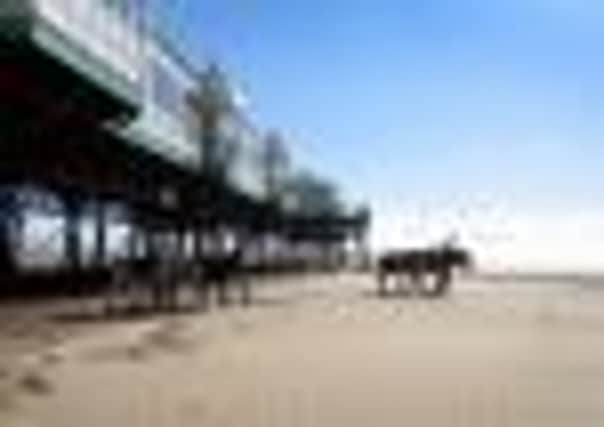Lytham St Annes: A tale of two seaside towns


LS Lowry loved Lytham St Annes. He spent his childhood holidays there and sketched and painted it throughout his life. Its offshore yachts figure in one of his earliest works – from 1902, when he was 15 – and in one of his last, from 1975, the year before he died. He had a taste for smaller seaside resorts, but his Lytham is a curious, rather bleak place, full of greys and muddy browns and loneliness, and it hardly matches the place today.
I say “the place”, but in fact it’s two distinct places – Lytham and St Annes, lumped together as the Morecambe and Wise of the Lancashire coast. St Anne’s is a small but bustling resort with a pier, a padding pool and a bandstand: a fully-fledged slice of seaside life. Lytham is an even smaller residential town fronting the estuary of the River Ribble, rather than the sea, with the street lights of Southport twinkling comfortingly across the water.
Advertisement
Hide AdAdvertisement
Hide AdMy wife Clare and I have taken the road to Lytham pier for a weekend with a mission: never to mention the elephant in the room, or perhaps the donkey in the sea-front shelter: Blackpool, which lurks dangerously around the corner. That “great roaring spangled beast” of a town, as JB Priestley called it, may be just six miles away, but it might as well be in a different universe. You may catch the odd distant shriek from a Pleasure Beach roller-coaster, or a hen-party cackle from the Golden Mile, but they’re like noise from a distant jungle. Where Blackpool is big and brash and boasts about it, Lytham is small and select, a place – like Grange-over-Sands, or Southwold in Suffolk, or even, on the right day, Filey – to wear your Panama hat with pride.


We drive over the Pennines and do our best to avoid the M55, which zaps you straight into Blackpool like a bolt from a crossbow. Instead, we trundle through pretty villages with duckponds and weeping willows and houses called Glengarry and Whisp’ring Trees, past fields of buttercups, through delightful countryside you might not expect here.
Once in Lytham, you can’t move for middle-aged people wearing cream“slacks” and trim jackets and even the odd straw boater. Perhaps the Smartness Police tour the hotels every night: “Any people wearing tracksuits and trainers staying here? Turf ’em out. Send ’em up the road. We don’t want their sort in Lytham!”
There are certainly none of their sort at the hotel where we’re staying, the Clifton Arms, behind the broad green that stretches along the front. It’s a classy place, dating back 300 years, comfortable and “traditional”, with waiters who remember how long you like your breakfast egg boiled. “Tea, mes amis?” says one as she brings us a pot. Churchill used to stay at the Clifton when the Tory party conference was being held in Blackpool. The journalist Paul Johnson once met him smoking a cigar on the hotel steps. How, asked Johnson, did he explain his success in life? “Conservation of energy,” said the great man. “Never stand up when you can sit down, and never sit down when you can lie down.”
Advertisement
Hide AdAdvertisement
Hide AdWe’re tempted to follow his advice as we sit at our bedroom window drinking tea brewed in a Wedgwood teapot. Outside, mature ladies with pom-pom perms walk their pom-pom poodles along the prom. There’s a great feeling of well-being. It still feels like the seaside world of the early 1960s when, as one guidebook noted, “an orchestra plays daily” at the Floral Hall and “successful London plays are presented by a repertory company at the Ashton Pavilion”. The more select hotels offered cocktail lounges, children’s high tea and (small fanfare) electric fires in the bedrooms.


When I last came here 25 years ago, I could find almost nothing of interest. But it has changed and so have I. Smart rows of mews cottages with wrought iron balconies and beds of lupins and petunias, and ornamentally pebbled pavements, now have an engaging charm. Who can argue with a place where a £10 ticket for a church concert “includes a glass of wine and ice cream sundae”?
In those 25 years, Lytham seems to have moved seamlessly upmarket. The old square has been restyled as a piazza with open air cafes. There’s no shortage of smart shops. A ladies’ outfitter proclaims its cosmopolitan frame of reference with a list of Lytham’s fashion-centre rivals: London, New York, Paris, Milan.
Flashy cars deliver even flashier young women to wine and tapas bars, and older locals chunter about the recent influx of bling-laden footballers that has pushed up house prices.
Advertisement
Hide AdAdvertisement
Hide AdThere’s admittedly not much of a beach, more a salt marsh. But there’s a glorious beach at St Anne’s, which merges with Lytham somewhere along a parade of classy retirement homes. St Anne’s is recognisably “seaside”, with a busy shopping centre, a (rather sedate) statue of Les Dawson, who lived here, and a stubby Victorian pier tufted with turrets and playful with pagodas.
A busker serenades the passing crowds with All My Loving and Money Can’t Buy Me Love. “I’ll get you a plate for’t’chips for’t’little lad,” a kiosk assistant tells a parent. But St Anne’s is not high on irony. The Sunday afternoon concert at the bandstand, a sign says, will feature “Sixteen Men Swinging”.
Driving out of town we catch a glimpse of Blackpool Tower, we flee inland, to a small town where, at 4pm on a summer afternoon, three teashops are closing. How very English. “Why are you closing just when people want a cup of tea?” I ask one proprietor. “Because it’s our choice,” he says, and shuts the door. We return to the charms of Lytham where such outrages are few and far between.
• Clifton Arms Hotel (01253 739898; www.cliftonarms-lytham.com). Information about Lytham St Annes: 01253 725610; www.visitenglandsnorthwest.com.